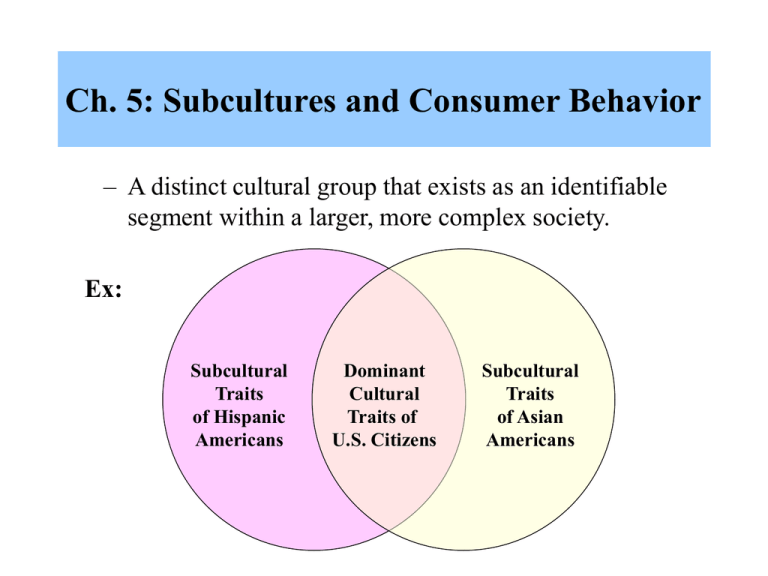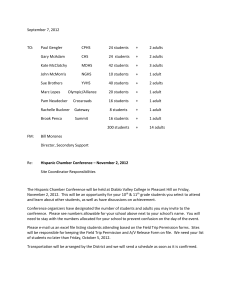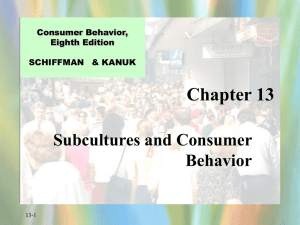Ch. 5: Subcultures and Consumer Behavior - UAH
advertisement

Ch. 5: Subcultures and Consumer Behavior – A distinct cultural group that exists as an identifiable segment within a larger, more complex society. Ex: Subcultural Traits of Hispanic Americans Dominant Cultural Traits of U.S. Citizens Subcultural Traits of Asian Americans Importance of Subcultures Identification with core culture Core culture values and norms Identification with a subculture Subculture values and norms Mass market behaviors Individuals Unique market behaviors Types of Subcultures Categories Examples of Subcultures Age Adolescent, young adult, middleaged, elderly Ethnic Origin African, Hispanic, Asian, European Gender Female, male Income Level Affluent, middle income, poor, destitute Nationality French, Malaysian, Australian Types of Subcultures (cont.) Categories Examples of Subcultures Religion Jewish, Catholic, Mormon, Buddhist Family Type Single parent, divorced/no kids, two parents/kids Occupation Mechanic, accountant, priest, clerk Geographic region New England, Southwest, Midwest Community Rural, small town, suburban, city Traditional Characteristics of the Hispanic American Market • • • • • • • • • • Prefer well-known or familiar brands Buy brands perceived to be more prestigious Are fashion-conscious Historically prefer to shop at smaller personal stores Buy brands advertised by their ethnic-group stores Tend not to be impulse buyers (i.e., are deliberate) Increasingly clipping and using cents-off coupons Likely to buy what their parents bought Prefer fresh to frozen or prepared items Tend to be negative about marketing practices and government intervention in business Ways in Which “Hispanic” Has Been Defined NAME OF INDICATOR NATURE/SCOPE AND COMMENTARY Spanish surname Not a definitive; since a non-Hispanic person might have a Spanish surname, or an Hispanic person might have a non-Spanish surname. Country of origin The birthplace of persons born in the Untied States of Hispanic parents would not reveal their Hispanic background. Country of family ancestry Includes those individuals who may not be Hispanic despite coming form a particular Spanish-Latin country. Spanish spoken at home A significant minority of Hispanic households may speak English at home, yet consider themselves to be cultural Hispanic. Selfidentification It is reasonable that if an adequate number of self-report choices are offered, a person might identify himself or herself as “Hispanic.” Degree of identification This measure captures the “degree” of personal identification as “Hispanic” and augments the self-identification measure. Travel-Related Behavior of Jewish vs. and General Population BEHAVIOR JEWISH TOTAL MEDIA U.S. READER AVERAGE Taken a trip outside the U.S. within the past 3 years 60.3% 18.4% Taken 10 or more trips outside the U.S. within the last 3 years Taken a cruise within the past 3 years Belong to a frequent flier program 6.9% 31.4% 67.5% 1.2% 6.4% 9.1% Personally rented a car within the past 12 months 48.1% 11.4% Regional Consumption Differences Northeast Media Cosmopolitan Outdoor Life Vibe Premiere Religious radio “Nick at Nite” North Central South West 96 97 179 83 54 122 84 131 100 105 109 110 106 89 67 83 143 90 111 88 81 138 63 85 Hobbies/Activities Hunting (with rifle) 96 Tennis 100 Movie attendance 107 Attend high school sports 82 132 78 82 148 92 84 81 93 81 151 145 75 Regional Consumption Differences (cont.) Northeast North Central South West Product Use Imported wine Domestic wine Diet cola drinks Regular cola drinks Mouthwash Laptop/notebook 136 118 94 75 111 111 95 68 129 87 100 72 90 68 95 134 99 75 87 171 82 81 92 161 Restaurants/Shopping Fast-food restaurants Kmart The Gap Eddie Bauer Banana Republic 74 93 162 103 134 110 123 93 123 82 113 91 74 59 75 92 95 93 139 128 Acculturation The process by which people in one culture or subculture come to understand and adapt to the cultural meanings used in another culture or subculture. Consumer acculturation – how people acquire the ability and cultural knowledge to be a skilled consumer in a different culture or subculture. • • • • Honeymoon stage Rejection stage Tolerance stage Integration stage






